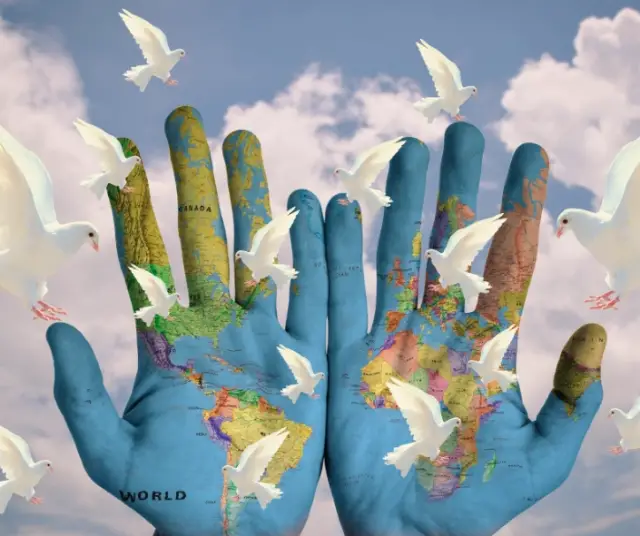Every September 21, Colombia joins the international community to celebrate the International Day of Peace , a date dedicated to promoting non-violence, the peaceful resolution of conflicts and the construction of more just and equitable societies. In a country marked by decades of armed conflict and internal divisions, the celebration of this day takes on special significance.
Peace in Colombia
Colombia has witnessed one of the longest armed conflicts in recent history, with more than half a century of violence deeply affecting its society. Although the Peace Agreement signed in 2016 between the Colombian government and the FARC ( Revolutionary Armed Forces of Colombia ) marked an important milestone in the search for peace, the path towards a complete and lasting reconciliation is complex and challenging.
The armed conflict has left an indelible mark on Colombian society, with millions of victims and entire communities displaced and traumatized. The promotion of peace is not only the absence of violence, but also the creation of conditions for social justice, inclusion and equity.
Efforts for Peace
The road to peace in Colombia has been a journey full of challenges, but also one of courageous efforts and significant progress. Over the years, the country has experienced key moments that have set the course towards a more peaceful and just society. Although the process has not been without difficulties, the peace efforts have demonstrated the resilience and determination of the Colombian people to overcome decades of conflict and build a better future.
The Peace Agreement with the FARC: A Historical Milestone
One of the most transcendental milestones in the search for peace in Colombia was the signing of the Peace Agreement with the FARC in 2016. After more than four years of negotiations in Havana, Cuba, the Colombian government and the Revolutionary Armed Forces of Colombia ( FARC ) reached a historic agreement that sought to end more than half a century of armed conflict.
The agreement addressed crucial issues such as transitional justice, the political participation of ex-combatants, agrarian reform and the fight against drug trafficking. Although the agreement was greeted with hope and optimism, its implementation has faced significant obstacles and challenges. The reintegration of ex-combatants into civilian life, land restitution, and the search for truth and reconciliation are complex processes that require time and ongoing effort.
Peace Talks with Other Armed Groups
In addition to the agreement with the FARC, Colombia has sought to establish peace talks with other armed groups and criminal organizations that have contributed to instability in different regions of the country. These dialogues seek to end violence and create conditions conducive to reconciliation and sustainable development.
One of the most prominent examples is the peace process with the National Liberation Army ( ELN ), another guerrilla group. Although the talks have had ups and downs and have been suspended on several occasions, the search for a peaceful solution through dialogue continues to be a priority to achieve comprehensive peace in Colombia.
The implementation of the peace accords and the search for genuine reconciliation have not been without difficulties. One of the key challenges has been the security of ex-combatants and social leaders. Violence against community leaders and human rights defenders has been an obstacle to the construction of peace and has generated concern in the international community.
The reintegration of ex-combatants into civilian life has also been a complex process. The transition from a life in the guerrilla to a peaceful and productive life can be difficult, especially when faced with obstacles such as stigma and a lack of economic opportunity. Guaranteeing the effective reintegration of ex-combatants is essential to consolidate peace and prevent a recurrence of violence.
While peace efforts at the government level are essential, it is also crucial to recognize the essential role that communities and civil society play in building sustainable peace. Throughout Colombia, numerous non-governmental organizations, community leaders, and activists have worked tirelessly to promote reconciliation and address the root causes of the conflict.
Local reconciliation initiatives, community development projects and peacebuilding activities have demonstrated their ability to make a positive impact on the lives of people affected by the conflict. These actions at the local level help to create a stronger social fabric and empower communities to take charge of their own peace process.
Challenges and Obstacles
Despite the progress achieved, Colombia faces considerable challenges on its path towards sustainable peace. One of the main challenges is the persistent violence in some areas of the country due to the presence of illegal armed groups and the fight for control of natural resources and drug trafficking routes. Lack of access to basic services, poverty, and a lack of economic opportunity can also fuel instability.
Political and social polarization is also an obstacle to peace. Peacebuilding implies not only the demobilization of armed groups, but also the creation of an environment in which differences can be resolved peacefully and democratically.
Initiatives and Key Actors
Throughout Colombia, various organizations, community leaders, and activists are working tirelessly to promote peace and reconciliation. Non-governmental organizations, religious groups and community leaders play a crucial role in building bridges between divided communities and promoting intercultural dialogue.
The National Center for Historical Memory of Colombia seeks to preserve the collective memory of the armed conflict and provide a space for victims to tell their stories. Arts, culture and education initiatives also play an important role in building peace by promoting creative expression and fostering understanding between different groups.
Education plays a fundamental role in promoting a culture of peace in Colombia. Teaching values such as tolerance, respect and the peaceful resolution of conflicts from an early age can lay the foundation for a more harmonious society in the future. Schools and educational institutions have a responsibility to promote education for peace and social justice.
